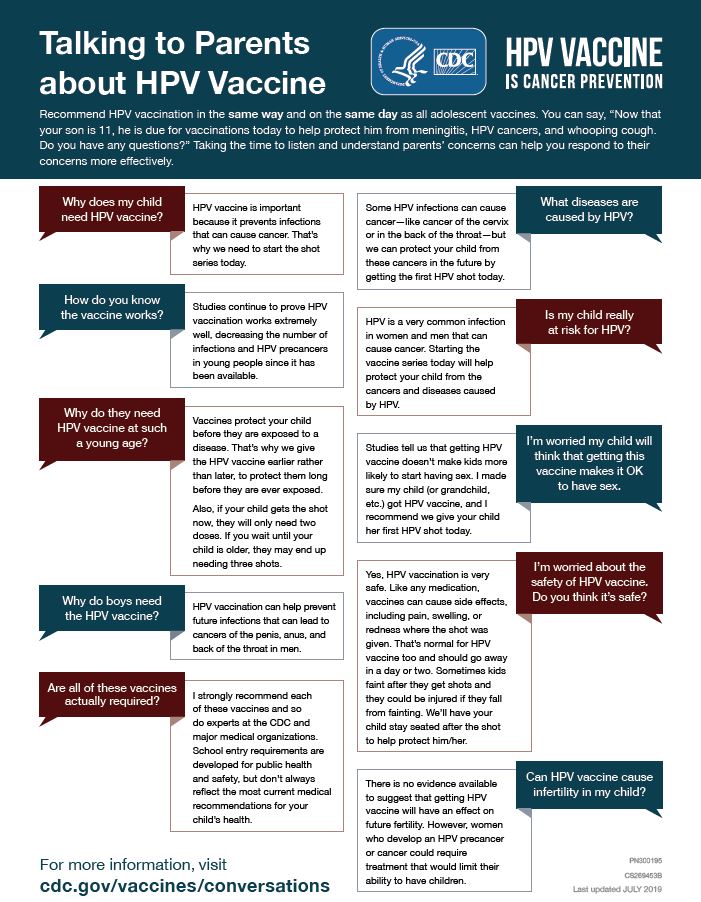HPV Vaccine Recommendations
On This Page
For the full text of CDC’s Advisory Committee on Immunization Practices (ACIP) recommendations, see the Human Papillomavirus (HPV) ACIP Vaccine Recommendations.
Vaccine Recommendations
- HPV vaccine is recommended for routine vaccination at age 11 or 12 years. (Vaccination can be started at age 9.)
- ACIP also recommends vaccination for females aged 13 through 26 years and males aged 13 through 21 years not adequately vaccinated previously.
- Vaccination is also recommended through age 26 years for gay, bisexual, and other men who have sex with men, transgender people, and for immunocompromised persons (including those with HIV infection) not adequately vaccinated previously.
Ideally, adolescents should be vaccinated before they are exposed to HPV. However, people who have already been infected with one or more HPV types can still get protection from other HPV types in the vaccine.
Dosing Schedules
Two doses of HPV vaccine are recommended for most persons starting the series before their 15th birthday.
- The second dose of HPV vaccine should be given 6 to 12 months after the first dose.
- Adolescents who receive 2 doses less than 5 months apart will require a third dose of HPV vaccine.
Three doses of HPV vaccine are recommended for teens and young adults who start the series at ages 15 through 26 years, and for immunocompromised persons.
- The recommended 3-dose schedule is 0, 1–2 and 6 months.
- Three doses are recommended for immunocompromised persons (including those with HIV infection) aged 9–26 years.
Contraindications and Precautions
A severe allergic reaction (e.g., anaphylaxis) to a vaccine component or following a prior dose of HPV vaccine is a contraindication to receipt of HPV vaccine.
- Anaphylactic allergy to latex is a contraindication to bivalent HPV vaccine in a prefilled syringe since the tip cap might contain natural rubber latex.
- Quadrivalent and 9-valent HPV vaccines are produced in Saccharomyces cerevisiae (baker’s yeast) and are contraindicated for persons with a history of immediate hypersensitivity to yeast.
- A moderate or severe acute illness is a precaution to vaccination, and vaccination should be deferred until symptoms of the acute illness improve.
- A minor acute illness (e.g., diarrhea or mild upper respiratory tract infection, with or without fever) is not a reason to defer vaccination.
Pregnancy
HPV vaccine is not recommended for use during pregnancy.
- The vaccine has not been causally associated with adverse pregnancy outcomes or with adverse effects on the developing fetus, but data on vaccination during pregnancy are limited.
- Women known to be pregnant should delay initiation of the vaccine series until after the pregnancy.
- Pregnancy testing before vaccination is not needed. However, if a woman is found to be pregnant after initiation of the vaccination series, the remainder of the series should be delayed until after she is no longer pregnant. No intervention is indicated.
Vaccine Safety
HPV vaccines are very safe. Scientific research shows the benefits of HPV vaccination far outweigh the potential risks. Like all medical interventions, vaccines can have some side effects.
All vaccines used in the United States, including HPV vaccines, are required to go through years of extensive safety testing before they are licensed by the U.S. Food and Drug Administration (FDA). During clinical trials conducted before they were licensed:
- 9-valent HPV vaccine was studied in more than 15,000 males and females
- Quadrivalent HPV vaccine was studied in more than 29,000 males and females
- Bivalent HPV vaccine was studied in more than 30,000 females
- Each HPV vaccine was found to be safe and effective.
Adverse Reactions
- The most common adverse reactions reported during clinical trials of HPV vaccines were local reactions at the site of injection.
- In prelicensure clinical trials, local reactions, such as pain, redness, or swelling, were reported by 20% to 90% of recipients.
- A temperature of 100°F during the 15 days after vaccination was reported in 10% to 13% of HPV vaccine recipients. A similar proportion of placebo recipients reported an elevated temperature.
- A variety of systemic adverse reactions have been reported by vaccine recipients, including nausea, dizziness, myalgia and malaise. However, these symptoms occurred with equal frequency among both HPV vaccine and placebo recipients.
- Local reactions generally increased in frequency with increasing doses. However, reports of fever did not increase significantly with increasing doses.
- No serious adverse events have been associated with any HPV vaccine. Ongoing monitoring is conducted by CDC and the Food and Drug Administration.
Syncope (fainting) can occur after any medical procedure, including vaccination. Adolescents should be seated or lying down during vaccination and remain in that position for 15 minutes after vaccination. This is to prevent any injuries that could occur from a fall during a syncopal event.



































No hay comentarios:
Publicar un comentario